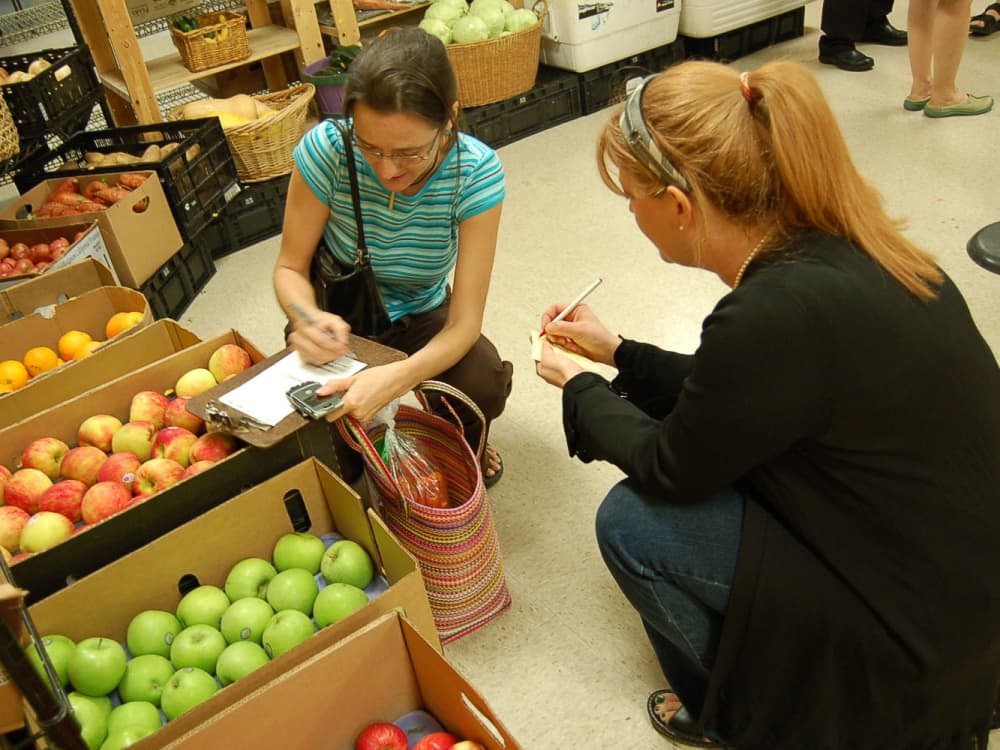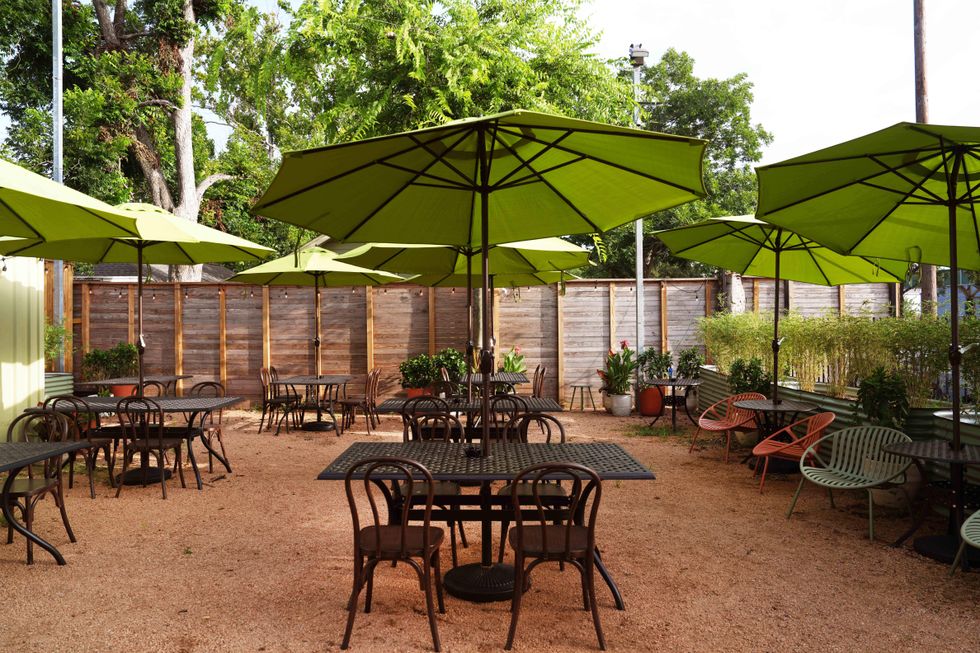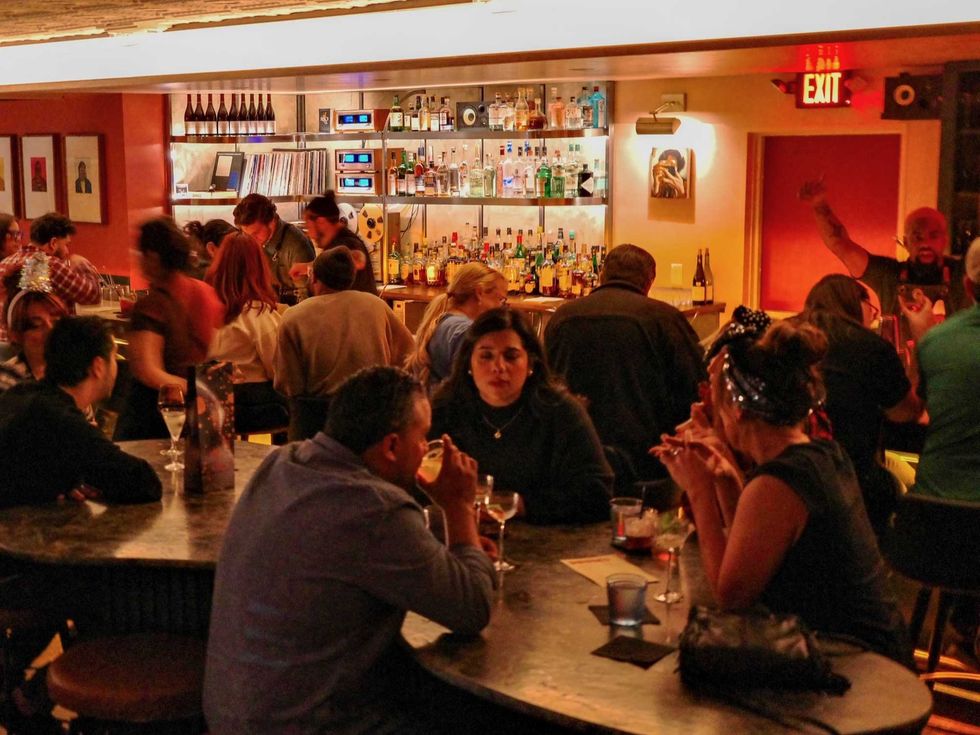Vegging Out
After a decade, Central City Co-Op still offers colorful personalities & veggiegoodness
 From left: Susy Shaprio, volunteer and local grower; Michele Corbin, co-opbookkeeper and partner of co-op; Liana Winkler, volunteer; Tiffany Tyler, chairon the co-op board of directors; Pat Greer, founder; Monika Cikart, customer;and Carolyn Lambeth, director of operations.Photo by Joel Luks
From left: Susy Shaprio, volunteer and local grower; Michele Corbin, co-opbookkeeper and partner of co-op; Liana Winkler, volunteer; Tiffany Tyler, chairon the co-op board of directors; Pat Greer, founder; Monika Cikart, customer;and Carolyn Lambeth, director of operations.Photo by Joel Luks Beautiful colors meant to inspire the most artful cooks.Photo by Joel Luks
Beautiful colors meant to inspire the most artful cooks.Photo by Joel Luks Wise advise. Eat your veggies.Photo by Joel Luks
Wise advise. Eat your veggies.Photo by Joel Luks Jennifer Georgantas, from left, Cassie Georgantas and Pat Greer
Jennifer Georgantas, from left, Cassie Georgantas and Pat Greer Red okra? Nothing like a colorful bounty to stimulate the appetite.Photo by Joel Luks
Red okra? Nothing like a colorful bounty to stimulate the appetite.Photo by Joel Luks On Wednesdays, Liana Winkler puts out a sign that transforms Grace LutheranChurch into Central City Co-op.Photo by Joel Luks
On Wednesdays, Liana Winkler puts out a sign that transforms Grace LutheranChurch into Central City Co-op.Photo by Joel Luks Selection of organic apples - granny smith and galaPhoto by Joel Luks
Selection of organic apples - granny smith and galaPhoto by Joel Luks Early shoppers pick up their organic vegetable shares, a weekly bounty of mostlylocal produce.Photo by Joel Luks
Early shoppers pick up their organic vegetable shares, a weekly bounty of mostlylocal produce.Photo by Joel Luks Offering more than produce, one can find organic grains, legumes, honey, coffeeand more.Photo by Joel Luks
Offering more than produce, one can find organic grains, legumes, honey, coffeeand more.Photo by Joel Luks I eat at least three of these a week.Photo by Joel Luks
I eat at least three of these a week.Photo by Joel Luks Crisp greens are plentiful.Photo by Joel Luks
Crisp greens are plentiful.Photo by Joel Luks A fragrant selection of fruitsPhoto by Joel Luks
A fragrant selection of fruitsPhoto by Joel Luks Organic peasPhoto by Joel Luks
Organic peasPhoto by Joel Luks Volunteers unload a truck filled with organic veggies.Photo by Joel Luks
Volunteers unload a truck filled with organic veggies.Photo by Joel Luks
It is amazing what happens in a decade. As I look back at what seems my not-so-distant past, I discover many rites of passage a twenty-something experiences: Post-graduate school, entering the workforce, discovering new talents and beginning a new career— careers, I suppose.
Then there is the weight gain, weight loss, changing hairstyles (longer, shorter), going through stuff, seeing a shrink, and, after all that, I am a different person than 10 years ago, almost unrecognizable, but stronger, and hopefully more patient and wiser.
Celebrating its 10th anniversary year, the Central City Co-Op is also almost unrecognizable — but also much stronger and wiser. What had started on the porch of Pat Greer’s oldest daughter, Jennifer Georgantas, is now a efficient operation of about 50 volunteers feeding 240 families, as well as six partner co-ops ranging from Clear Lake and Sugar Land to northwest Houston and Humble.
A community of like-minded people, CCC is a place where Houstonians can find organic local food, colorful personalities and veggie goodness. The friendships, rather “sisterhood” of the ladies behind Central City Co-Op, perhaps somewhat akin to the women in Steel Magnolias, begins with small-talk chatter, as they quietly set up for yet another Wednesday, as they have for the last nine years.
For me, 7 a.m. is early. A somewhat steamy and musky smoggy morning transforms Grace Lutheran Church on Waugh, their new locale, into a seemingly small old-fashioned town where friendships matter, people talk and Facebook is non-existent.
Coffee is made and by 7:30 a.m., activity picks-up. Produce delivered the night before is organized in both the “open market” area, where anyone can shop, and the member area, where those who pre-ordered a “share” can claim their goods: An allotment of seasonal organic bounty.
Rene, a driver for Country Fresh, awaits patiently in her truck while volunteers complete tasks necessary prior to unloading her organic delivery. A couple of strong men emerge from from somewhere inside the church. They know their role and do it well. Quietly, swiftly, and methodically.
“Bye guys!” Rene exclaims. “I love you, see you next week.”
Her charming accent and seemingly gentle eyes do not distract from her physical strength. This is a woman with whom you do not mess.
“I feel amazingly medicated,” one of the ladies says. Telling stories of their own and their family’s health, there is comfort in sharing life’s trials and tribulations. A surgery recovery, a traffic accident, and an out-of-state move dominate the conversation, all while they pay meticulous attention to the product.
“No depressing vegetables are allowed,” another demands. “I only want beautiful colors on my plate.”
Through this organized hustle and bustle, by 8:30 a.m. an area of the church is transformed into a beautiful and mouthwatering market of organic goodies filled with as much local produce as available.
“Jennifer and I were tired of paying big prices for organic fruits and vegetables,” Greer recalls. “We looked for a source to supplement the local produce we were getting from Gundermann Farms in Wharton. While talking on the phone one day and playing with a bunch of parsley, I noticed a recipe on the label, flipped it over and called a local distributor. ‘ Co-ops? why sure, we have them all over town.’ We called a few friends and here we are, celebrating our 10th anniversary.”
I sit and share a cup of coffee with my guide, Liana Winkler, a potential incoming board member, elections pending, who is very passionate about her food and Katy Carpman, who works at a church and organizes Westside Organic, a partner co-op near Highway 6 and Little York.
“The co-op is very seasonal in a funny way,” Carpman says. “I see increased demand in January, perhaps because of New Year’s resolutions to eat better and more organic. In the summer, we are in a lull as folks leave to spend the summer elsewhere. Then there is the start of school, when parents realize their kids are growing and they should probably feed them more.”
Winkler has a routine. A Tuesday email lets co-op members know of what’s in store for them the next morning, including recipe ideas. Winkler plans her meals and looks forward to seeing her co-op family, “from the granola to the immaculate professional types.”
“I don’t have a vegetable garden but I have the co-op,” Winkler says. “I want to feed myself well, and I found a community of people that have the same mindset.”
As an avid cook, I admire the sexy and oddly shaped prickly Suyo Long cucumbers, the exotic and fragrant lemongrass, seductive figs and of course, the robust and fiery hot peppers that keep my culinary imagination on hyper-drive, encouraged by now my third cup of coffee.
But it is the artful red okra that catches my attention and I cannot help photographing it repeatedly.
“We also have had other cool produce you can’t find anywhere else,” Tiffany Tyler, chair of the board, says. ”Purple okra, jujubes, tiny local strawberries sweet as candy, local garlic, local muscadine grapes, local banana figs and dinosaur kale— and what kid wouldn’t want to at least try that?”
I do, pretending to raise my hand.
By 9 a.m., shoppers start pouring in, some with that I-just-got-out-of-bed look. The early risers are there to pick-up their pre-ordered shares. Anything left over at the end of the day is packaged and donated to the Houston Food Bank and other food pantries.
“When people seem to find us, it is with an open mind. They have made the connection that food is grown by people, and some of it has dirt on it,” Carolyn Lambeth, director of the co-op, explains. Lambeth is sassy, witty and welcoming, keeping the co-op running smoothly. “They are ready for food exploration; they desire to enjoy new and different tastes and textures. Of course they are always excited to realize eating healthy and well can also be economical.”
With a goal to ultimately spread this experience and model throughout Houston, including underserved communities and schools, the “gospel” of the co-op is that the fruit of the land, not the processed and prepackaged food, is what nourishes people.
“We want to encourage and inspire sustainability in all its forms, supporting community-based agriculture and learning,” Lambeth says. She shares Greer’s herculean dreams of having a co-op in every neighborhood with a larger main location, store front, gathering place, teaching facility and restaurant.
It’s 9:30 and the energy is contagious. I am nudged and reminded that anyone can join the party — new members and volunteers are always needed and welcomed. As I chuckle, losing track of time and somewhat late for my next appointment, I commit a fatal foodie faux-pas: I leave forgetting to purchase anything. And I had my eye on the red okra.
Ten Years. Good reason to return. Next Wednesday.










